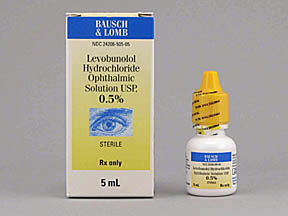
Levobunolol Coupons & Savings Card – Discount Prices from $12.92
My prescription
Edit
5ML of 0.5%, Levobunolol (1 Bottle)
Select pharmacy

CVS
$27.60
COUPON PRICE
Walgreens
$12.92
COUPON PRICE
Walmart
$13.97
COUPON PRICE
Albertsons
$21.04
COUPON PRICELevobunolol savings card
Show this card to your pharmacist
Walgreens
$12.92
BIN
ID
PCN
GRP
019876
LH7D11AE65
CHIPPO
LHX
Powered by
More prescriptions for glaucoma
More prescriptions for glaucoma
Levobunolol dosage forms
Dosage Quantity Price from Per unit 5ML of 0.5% 1 Bottle $12.92 $12.92 5ML of 0.5% 2 Bottles $31.94 $15.97 5ML of 0.5% 3 Bottles $54.35 $18.12
| Dosage | Quantity | Price from | Per unit |
|---|---|---|---|
| 5ML of 0.5% | 1 Bottle | $12.92 | $12.92 |
| 5ML of 0.5% | 2 Bottles | $31.94 | $15.97 |
| 5ML of 0.5% | 3 Bottles | $54.35 | $18.12 |
Levobunolol Warnings
This medication comes with several important safety warnings you should be aware of. Please read through them carefully and contact your healthcare provider if you have any questions or concerns.
Risk of Heart Failure: Beta blockers such as levobunolol (Betagan) can cause new or worsening heart failure. Notify your healthcare provider immediately if you experience swelling in your feet or ankles, an irregular or rapid pulse, or shortness of breath when lying down or during exercise. These may indicate heart failure. Particular caution is advised if you have a history of heart failure.
Use Caution with Blood Circulation Issues: Inform your doctor if you suffer from conditions affecting blood circulation, like Raynaud's syndrome or reduced cerebral blood flow, as levobunolol (Betagan) may exacerbate these conditions.
Not Suitable for Individuals with Respiratory Issues: Levobunolol (Betagan) is not recommended for individuals with lung conditions, such as asthma or chronic obstructive pulmonary disease (COPD), as it can constrict airways and cause breathing difficulties.
Masking Symptoms of Low Blood Sugar: This medication can conceal symptoms of low blood sugar, excluding sweating and dizziness, which may be problematic for those with diabetes. A small amount of the medication can be absorbed systemically from the eye drops, potentially leading to this effect. Discuss any concerns with your healthcare provider, especially if you are diabetic and using insulin or oral diabetes medications.
Masking Symptoms of Overactive Thyroid: Levobunolol (Betagan) may hide signs of hyperthyroidism (overactive thyroid), such as a rapid heartbeat. Ensure your healthcare provider is aware of any thyroid issues before starting this medication.
Exacerbation of Myasthenia Gravis: Although rare, this medication can worsen muscle weakness in individuals with myasthenia gravis. Monitor for any worsening symptoms and report them to your healthcare team.
Allergic Reactions: The medication contains a sulfite, which can trigger allergic reactions, including asthma attacks or anaphylaxis, in sensitive individuals. If you are allergic to sulfites or other beta blockers, inform your healthcare provider, as this medication might not be suitable for you.
Contraindications: Levobunolol (Betagan) should not be used in the following conditions due to potential serious health risks. Consult your healthcare provider if any of the following apply to you:
- Asthma
- Severe chronic obstructive pulmonary disease (COPD)
- Sinus bradycardia (slow heart rate)
- Second- or third-degree heart block
- Heart failure
- Cardiogenic shock
Always consult your healthcare provider for personalized medical advice and before making any changes to your medication regimen.
Levobunolol Side Effects
Common side effects:
- Temporary burning or stinging of the eye
- Headache
- Dizziness
- Tiredness
- Itching
- Inflammation of the eye, eyelid, or iris
- Temporary movement or coordination problems
Serious side effects:
- Eye pain, swelling, or discharge
- Reduced sensation in the eye
- Slow or irregular heartbeat
- Muscle weakness
- Hair loss
- Mental or mood changes
- Changes in vision
- Swelling of the ankles or feet
- Sudden unexplained weight gain
- Trouble breathing
- Chest pain
- Weakness on one side of the body
- Difficulty speaking
- Confusion
- Serious allergic reaction (rash, severe itching or swelling, especially of the face, tongue, or throat, severe dizziness, or trouble breathing)
Levobunolol Interactions
Interactions with high risk of serious adverse effects and should be avoided:
Interactions with moderate risk that may require dose adjustment, closer monitoring, or timing changes:
- Clonidine
- Propranolol
- Diltiazem
- Verapamil
- Phenothiazines
Interactions with low risk that usually do not require a change in therapy:
- Albuterol
- Ceritinib
- Crizotinib
- Dronedarone
- Fenoldopam
- Fingolimod
- Formoterol
- Indacaterol
- Levalbuterol
- Olodaterol
- Oxymetazoline
- Paroxetine
- Ponesimod
- Rivastigmine
- Salmeterol
- Terbutaline
- Vilanterol
